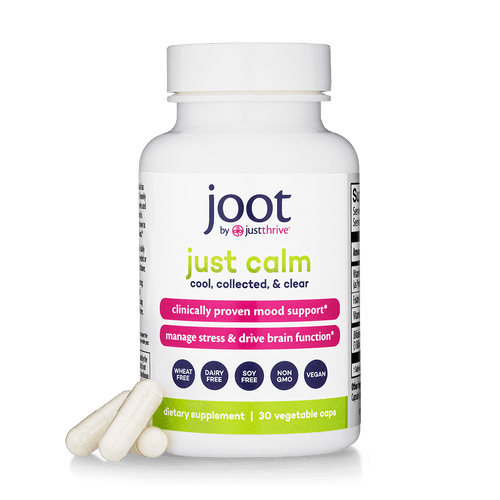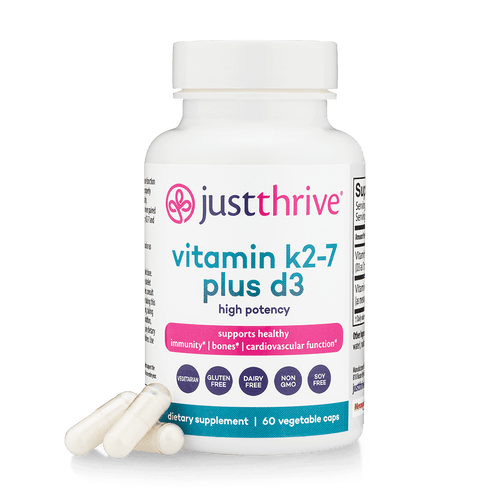Hint: It Starts In the Morning
Do you have a tough time falling asleep at night? Maybe you lie in bed while stressful thoughts cycle through your mind. Or maybe you feel too amped up to fully relax.
Whatever’s stopping you from sleeping, a relaxing bedtime routine will get you there.
And the best routines take place throughout the whole day. That’s because the things that are keeping you up are happening during the day. And if you proactively address them before bedtime, you’ll be snoozing before you know it.
5 Steps to Restorative Sleep
Step 1: Good Sleep Starts in Your Gut
Most people don’t realize this, but gut bacteria decides whether you’ll sleep well at night. In fact, scientists can tell if you have insomnia just by looking at your poop.[1]
Your gut microbiome contains trillions of bacteria, both beneficial probiotics and harmful pathogens. In a healthy balanced gut, a wide variety of probiotics vastly outnumber pathogens. You need those probiotic bacteria to help you sleep at night. They produce the chemicals your body needs to sleep, including:
- Melatonin: the sleep hormone that manages your body’s sleep function[2]
- GABA (gamma-aminobutyric acid): the brain chemical that helps your brain and body relax enough to fall asleep[3]
- Serotonin: the “feel-good” brain chemical that allows you to sleep more soundly[4]

Unfortunately, when your gut microbiome gets knocked out of balance—a condition called dysbiosis—pathogenic bacteria take over. Dysbiosis makes it more difficult to fall asleep and stay asleep.[5] An overgrowth of pathogens crowds out probiotic bacteria and limits production of essential sleep chemicals. Plus, the pathogens actively produce compounds that interfere with sleep.[6]
So keeping your gut microbiome in healthy balance is the first step toward getting a good night’s sleep. And the best way to do that is with high quality spore probiotics. When spore probiotics arrive in your gut, they promote other beneficial probiotic bacteria and help keep pathogens under control. Plus, spore probiotics help ramp up production of those crucial sleep compounds… so your body has the solid sleep supplies it needs.
That’s how a healthy sleep routine starts—by taking a probiotic every morning.
Step 2: Exercise During the Day
Getting exercise can help you fall asleep and improve your sleep quality. Several studies have shown that regular physical activity can act as an antidote to insomnia… as long as you don’t exercise too close to bedtime.
One 12-week study showed that alternating between aerobic exercise and resistance training for a total of six days per week improved both sleep quality and sleep duration in insomnia patients.[7]
On the flip side, research shows that not getting enough physical activity can result in:[8]
- Poor sleep quality
- More sleep disturbances
- Shorter sleep duration
- Taking longer to fall asleep
- More daytime sleepiness
Exercising regularly is an important part of a healthy sleep routine… as long as you do it earlier in the day so it doesn’t interfere with your sleep.
Step 3: Mind the Sleep Robbers
A lot of things can make it hard to fall asleep—some you have control over, others you may not. So controlling the ones you can will make falling and staying asleep easier.
Here are five things to avoid—especially near bedtime—if you’ve been struggling with insomnia:
- Caffeine
- Alcohol
- Cell phone use in bed (and other blue-light emitting devices)
- Napping during the day
- Eating late heavy meals
Being mindful of these night-time sleep thieves can help you take better control of your sleep experience.
Step 4: Create a Calming Sleep Environment
A sleep-promoting environment is a critical part of any sleep routine. Once you’ve created your ideal sleep space, it’s best not to use that space for other activities (like working in bed). You want your brain to associate that environment with sleep.
A calming sleep environment includes:
- Comfortable room temperature, ideally between 65–72 degrees
- Relaxing sounds like white noise, soothing music, or nature sounds
- Darkness, without lights or the light from screens
- Soothing aromatherapy scents like lavender or vanilla
- Supportive pillows and mattress
When you’re ready to settle down for the night, try some breathing exercises or mindful meditation to help get your body ready for deep, restorative sleep.
Step 5: Turn Down the Volume on Stress
Stress and sleep don’t go together. When you’re stressed all the time, your body never gets the chance to calm down. It’s always in a state of emergency, and that takes a steep toll on every cell, organ, and system. Stress interferes with restorative sleep—so even if you do manage to fall asleep, you still feel tired all the time.Your body counts on restorative sleep to perform repair and maintenance tasks. Quieting down stress so your body has a chance to fully rest can help you feel refreshed and revitalized.
Luckily, there’s a simple way to help your body deal with stress effectively. A unique probiotic that works like a “stress switch,” helping your body turn off stress and turn on calm.
Bifidobacterium longum 1714™ is a unique psychobiotic strain that’s been scientifically shown to help your body mount a healthy stress response. That means your body won’t feel constantly stuck in emergency mode, so it can just rest and relax.
Research shows that taking B. longum 1714™ regularly:
- promotes a healthy stress response[9]
- delivers a reduced sense of daily stress[9]
- increases theta wave activity in the brain, which promotes calmness and creativity[10]
- supports healthy sleep quality and duration even during stressful times[11]
Taking B. longum 1714™ regularly at bedtime is the final step in your relaxing bedtime routine. Combined with the full five-step plan, it can help you rest easy and wake up feeling ready to meet the day.
Create a Relaxing Bedtime Routine With Just Thrive
If you’d love to enjoy restful, restorative sleep… feel refreshed and ready to go every morning… Just Thrive can be an important part of your daily routine by balancing your gut microbiome and helping your body manage stress for a lasting sense of calm.
Just Thrive Probiotic & Antioxidant supports a well-balanced gut microbiome to encourage restful sleep. Just Thrive Probiotic delivers four clinically studied spore probiotics:
- Bacillus indicus HU36
- Bacillus subtilis HU58
- Bacillus coagulans (SC-208)
- Bacillus clausii (SC-109)
The four work together to promote a diverse population of beneficial bacteria in your gut microbiome. And a healthy gut is an important pillar of solid sleep.
Just Calm contains B. longum 1714™, the most heavily researched and scientifically verified strain available, along with a sleep-supportive combination of vitamins B6, B9, and B12.
Just Calm supports effective stress management while promoting an overall sense of well-being. This simple addition to your daily routine can help you embrace restorative sleep.
You can set the stage for a good night’s sleep by adding Just Thrive Probiotic and Just Calm to your relaxing bedtime routine.
We’re confident that when you take Just Thrive Probiotic and Just Calm as directed, you’ll enjoy all the benefits they deliver.
But if you’re not 100% happy, we’ve got your back.
At Just Thrive we offer you complete purchase protection with a 100% money-back guarantee.
If you’re not completely satisfied with your Just Thrive purchase for ANY reason, simply request a full product refund at any time… Whether it’s 3 days, 3 weeks or 3 months later… Even if the bottle is empty!
Sources
- Li Y, Zhang B, Zhou Y, Wang D, Liu X, Li L, Wang T, Zhang Y, Jiang M, Tang H, Amsel LV, Fan F, Hoven CW. Gut Microbiota Changes and Their Relationship with Inflammation in Patients with Acute and Chronic Insomnia. Nat Sci Sleep. 2020 Nov 5;12:895-905. doi: 10.2147/NSS.S271927. PMID: 33177907; PMCID: PMC7652227.
- Iesanu MI, Zahiu CDM, Dogaru IA, Chitimus DM, Pircalabioru GG, Voiculescu SE, Isac S, Galos F, Pavel B, O'Mahony SM, Zagrean AM. Melatonin-Microbiome Two-Sided Interaction in Dysbiosis-Associated Conditions. Antioxidants (Basel). 2022 Nov 14;11(11):2244. doi: 10.3390/antiox11112244. PMID: 36421432; PMCID: PMC9686962.
- Braga, J.D., Thongngam, M. & Kumrungsee, T. Gamma-aminobutyric acid as a potential postbiotic mediator in the gut–brain axis. npj Sci Food 8, 16 (2024).
- Appleton J. The Gut-Brain Axis: Influence of Microbiota on Mood and Mental Health. Integr Med (Encinitas). 2018 Aug;17(4):28-32. PMID: 31043907; PMCID: PMC6469458.
- Kang Y, Kang X, Cai Y. The gut microbiome as a target for adjuvant therapy in insomnia disorder. Clin Res Hepatol Gastroenterol. 2022 Jan;46(1):101834. doi: 10.1016/j.clinre.2021.101834. Epub 2021 Nov 18. PMID: 34800683.
- Li Y, Deng Q, Liu Z. The relationship between gut microbiota and insomnia: a bi-directional two-sample Mendelian randomization research. Front Cell Infect Microbiol. 2023 Nov 28;13:1296417. doi: 10.3389/fcimb.2023.1296417. PMID: 38089822; PMCID: PMC10714008.
- Dadgostar H, Basharkhah A, Ghalehbandi MF, Kashaninasab F. An Investigation on the Effect of Exercise on Insomnia Symptoms. Int J Prev Med. 2023 Feb 18;14:16. doi: 10.4103/ijpvm.ijpvm_204_21. PMID: 37033282; PMCID: PMC10080573.
- Associations between sleep quality and its domains and insufficient physical activity in a large sample of Croatian young adults: a cross-sectional study. Štefan L, Sporiš G, Krističević T, Knjaz D. BMJ Open. 2018;8:0.
- Allen AP, Hutch W, Borre YE, Kennedy PJ, Temko A, Boylan G, Murphy E, Cryan JF, Dinan TG, Clarke G. Bifidobacterium longum 1714 as a translational psychobiotic: modulation of stress, electrophysiology and neurocognition in healthy volunteers. Transl Psychiatry. 2016 Nov 1;6(11):e939.
- Wang H, Braun C, Murphy EF, Enck P. Bifidobacterium longum 1714™ Strain Modulates Brain Activity of Healthy Volunteers During Social Stress. Am J Gastroenterol. 2019 Jul;114(7):1152-1162. doi: 10.14309/ajg.0000000000000203. PMID: 30998517; PMCID: PMC6615936.
- Moloney GM, et al. Improvements in sleep indices during exam stress due to consumption of a Bifidobacterium longum. Brain Behav Immun Health. 2020 Nov 13;10:100174.














